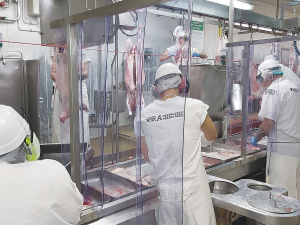Santa's present for the primary sector - an FTA with India
Primary sector leaders have welcomed the announcement of a Free Trade Agreement between India and New Zealand.
 The meat sector believes the Climate Change Commission's assumption that NZ can reduce livestock numbers by 15%, while still maintaining current production volumes, is overly optimistic.
The meat sector believes the Climate Change Commission's assumption that NZ can reduce livestock numbers by 15%, while still maintaining current production volumes, is overly optimistic.
New Zealand's meat processing industry says, while it supports moves away from coal, it has some major concerns about cuts to livestock numbers as proposed in the recent Climate Change Commission’s draft report.
The industry says it is generally supportive of the focus on reducing the use of fossil fuels. However, as the country’s largest manufacturing sector, it is worried about the impacts of the report’s stated 15% reduction in sheep, cattle and dairy numbers.
Meat Industry Association chief executive Sirma Karapeeva says the country’s red meat processors and exporters are committed to reducing and eventually eliminating the use of coal, although achieving the commission’s 2037 target will be difficult.
“We do need a fair and just transition away from coal to ensure jobs and livelihoods are not put at risk. However, our chief concern is that any drop in livestock numbers may jeopardise the viability of some processing plants and jobs in rural communities,” Karapeeva explains.
“Meat processors rely on throughput of livestock to create efficiencies of scale and be profitable.
“The commission estimates that without major on-farm practice change and new technologies, a 15% reduction in livestock numbers will be required to achieve the targets by 2030.
“This would have a serious impact on the ability of many processors to keep operating.”
She adds that the assumption by the commission that we can reduce livestock numbers by 15%, while still maintaining current production volumes, seems optimistic.
“We need to understand why the commission made this assumption to better assess the likely effects for the industry.”
However, Karapeeva says the meat sector agrees with the commission – and sheep and beef farmers – that the widespread planting of exotic pine trees is not a long-term viable solution to addressing climate change.
“We can’t plant our way out of climate change. Wholesale planting of pine trees on sheep and beef farmland is not the answer and it will have significant implications for jobs in regional New Zealand,” she adds.
Currently, NZ’s red meat processing sector generates more than $10 billion in export revenue every year and is also a significant regional employer in New Zealand.
Karapeeva says any changes to this would have a major impact on people’s livelihoods – especially in regional parts of the country.
“For instance, in the Otago/Southland region, the sector employs 7,700 full-time people with more than 10,000 full-time jobs underpinned by the industry. It also contributes 11.5% of household income in the region,” she explains.
“In Taranaki/Manawatu and Whanganui, the sector supports almost 10% of full-time employment in the region with 5,200 directly and it underpins more than 8,300 full-time equivalent jobs.
Mating wrapped up last month at the across-breed Beef Progeny Test on Pāmu’s Kepler Farm in Manapouri.
Libby Judson is a keeper of memories from an age gone by. Tim Fulton tells her story.
A New Zealand-first native tree study has highlighted the Bioeconomy Science Institute's position as a forestry research leader.
Hemp fibre processor Rubisco is relocating its core processing facility to Ashburton as part of a $20-$30 million expansion to leverage what it says is an accelerating global demand for sustainable and renewable fibres.
Tradition meets some of the latest in technology at the 2026 East Coast Farming Expo.
Dairy prices have jumped in the overnight Global Dairy Trade (GDT) auction, breaking a five-month negative streak.

OPINION: If the hand-wringing, cravat and bow-tie wearing commentariat of a left-leaning persuasion had any influence on global markets, we'd…
OPINION: With Winston Peters playing politics with the PM's Indian FTA, all eyes will be on Labour who have the…